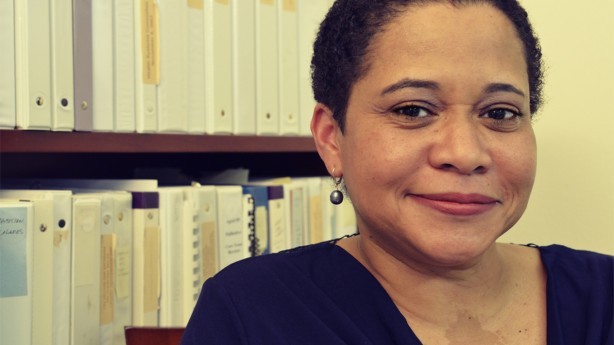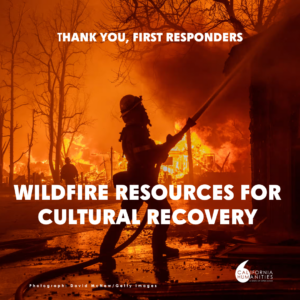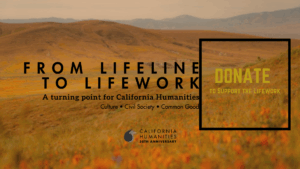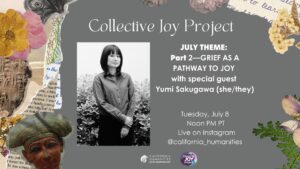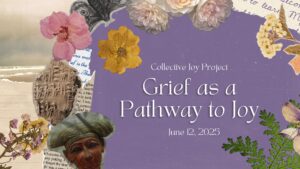“Science is not enough by itself; love is not enough by itself. As clinicians, loved ones, or caregivers, we are liable to miss something important, until we try something new.”
Healing has as much to do with the soul as the body. Through the Literature and Medicine program, which we’re bringing to VA hospitals in California, we take a look at how the humanities can be a support to our healthcare providers and their most vulnerable patients. By facilitating discussions about issues revealed by poetry, personal narratives, fiction, films, and more, we hope to uncover the realities of people’s lives as no x-ray can.
California Humanities Literature & Medicine Program participant Dr. Denise Henderson, MD, is a Diplomate American Board of Psychiatry and Neurology, working at the Sacramento VA hospital with patients experiencing post-traumatic stress disorder (PTSD). She took a moment to share with us how the program has impacted her practice.
Q: Can you describe the type of work you do with veterans?
A: I supervise the providers on the PTSD team at Mather and the PTSD psychiatrists at Oakland and Martinez. I help the patients with medication evaluations and educate them on their options for treatment. I founded and facilitate the Military Minority Matters group. It helps veterans who have suffered cultural disparities while in the military.
Q: What do you, as a healthcare provider, first experience when you are introduced to a new patient?
A: With a new veteran patient I experience the curiosity and wonder of opening a box of chocolates. The typical veterans upon first arrival will judge whether they can trust sharing their story. If they have been treated before, I try to maximize the benefits and minimize risks involved with medication therapy. They will quickly assess if they want to work with me. If they are fresh from combat, I project how important it is for them to engage in treatment early because, if they do not, they may not get the help they need and will develop a more complex and prolonged condition. I try to give them hope and information so that together we can develop a treatment plan that will result in improving the areas of life that are important to them.
Q: What are some of the challenges faced by healthcare professionals working with veterans?
A: Some of the challenges include realizing how brave they are for seeking treatment and when needed, how much they have given to deserve treatment. I pay attention to the losses they have experienced that are not visible or readily detected. What they need for recovery is more than a pill, a procedure, or benefit. They usually want to fit back into civilian life. They want to enjoy and be enjoyed by their significant others, families, and friends. They want to engage in meaningful activities.
Q: Could you describe the Literature and Medicine Program–its structure, content, goals, and participants?
A: The Literature and Medicine program is a group of providers from diverse disciplines, led by an informed guide to share thoughts on multiple subjects resulting in improved compassion and understanding for each other and our veterans. It helps with the development of new relationships and the sharing of varied thoughts and perspectives.
Q: Was there a passage you read in the literature provided which shifted your understanding of your patients or the type of care you were providing?
A: Yes. I was impacted during a discussion of “The Enduring Chill” by Flannery O’Connor. The setting was one where Blacks were called Negroes. The role of the Negroes in the story was reflective of a time that some people try to forget. In this reading, an adult Black male was referred to as “boy” by a younger white male. The importance of the Black men was not readily identified to the casual reader. As I read it, I saw parallels in today’s society. I was not able to get a discussion going about how some Blacks feel marginalized and dismissed today. I tried twice and the topic was quickly dismissed twice. I realized that I was experiencing what some of the minorities I treat are experiencing. I further realized that talking about the role of “Negroes” is one I should share with those who can barely stand the mentioning of our racial history as something that is relevant today. Relationships form and expose the human experience. I want to discuss these relationships.
“It is difficult to grow fruit where the sun does not shine.”
Q: Since participating in the Lit & Med program, was there ever a moment in which you called upon what you learned from a reading that affected you in your workplace?
A: I have recently joined the group. In my limited experience with this workshop, I am pleasantly surprised that it has had a positive impact on my awareness. In my approach to treatment before participating in the workshop, I thought my colleagues were aware of their interactions with minorities and consciously chose how to treat some patients based on race, sex, or sexual identity. Now, I know that many are simply not comfortable with the reality of certain relationships stemming from our collective American history. It is difficult to grow fruit where the sun does not shine. It is difficult if not impossible to develop cultural competency without open discussion.
Q: Why are the humanities important?
A: The humanities are important because, thanks to them, one can improve one’s view of life by interpreting key elements of human experiences through expressions of various mediums that record them. This process can yield wisdom and maturity. It is essential to have humanities included in our lives. It helps me develop a broader range of philosophies to live by and understanding of the history that brings me to the present.
Q: Would you share an excerpt from a reading in the Lit & Med program that impacted you?
A: In “What Remains” by Emma Donoghue, there was a passage in the story about two famous sculptors that worked and lived together. The two octogenarians were on a day trip to see one’s sculpture.
“I reach over to take her hand. But she has her head down again; she seems to be examining an egg stain on her lapel. A dreadful thought occurs to me. I let go of her hand and wave my fingers in front of her face. She doesn’t flinch.
‘Queenie?’
She looks in my direction. Her eyes are calm and milky. She can’t see a thing.
I should have guessed. I should have remembered her eyes were getting worse; I would have, if I’d half a brain left myself.”
This impacted me. No one thing, including love, is enough to understand each other. Great love was shared between these two women. We have to keep shifting our thinking to be more aware of who we care for. Science is not enough by itself; love is not enough by itself. We must practice mindfulness in our daily affairs, should we want to see the reality of our circumstances. As clinicians, loved ones, or caregivers, we are liable to miss something important, until we try something new.
Our involvement in Literature & Medicine: Humanities at the Heart of Health Care® is part of a national effort initiated by the Maine Humanities Council to improve health care through humanities approaches.
Click HERE to watch a short video about Literature & Medicine, including interviews and insights from other program participants.
“No one thing, including love, is enough to understand each other. We have to keep shifting our thinking to be more aware of who we care for.”

